As promised, my fight against the corrupt LA Times for defaming me as a favor to LAPD Chief Charlie Beck continues.
After being ordered by the judge to conform to court rules governing the length of motions (15 pages, the Times did 27.5), the first of the Times’ three (!) abusive anti-SLAPP motions against me — a delaying tactic meant to discourage me for pursuing my claim — is due at the court in a couple weeks, in early May. We have eight days to respond to each of three, each due a week apart. Hearings resume over the course of three weeks in late June and early July and yes, are open to the public. So if you’re in LA…
For everyone else, I’ll keep you posted here.
In other news, I have one of the worst cases of viral conjunctivitis you can get. I literally might be blind in both eyes by the end of next week. Or not. This is the #1 cause of blindness in the world, so I’m taking it seriously.
Fortunately, I have an amazing pair of top-notch doctors working on it. But neither of them is particularly optimistic. So if you pray or cross your fingers or whatever, I could use your good vibes. If I suddenly stop posting any cartoons or columns within the next few weeks, that’ll be why.
People are asking me how I got it. I was tested and there are no underlying diseases responsible. Look this up and you’ll find zillions of possible infections that can manifest as “pink eye.” Such an innocuous name for such a nasty virus…like tennis elbow and swimmer’s itch, both of which seriously suck but sound cute. In my case, it’s just one of those random things. Someone with the virus touched something somewhere that I touched, and then I touched my face and that was that. So aside from washing your hands hundreds of times a day, there’s nothing much you can do to avoid my fate.
It’s a cliché, but here goes anyway: these things really make you appreciate things you take for granted. In my case, seeing things. I’ll really miss it if the worst happens and not just because I’m especially visual or because I earn a living drawing and writing. I could use Dragon Dictation or Siri to write. I could do radio and podcasts. I would find something to do for money.
Now back to my battery of multiple antibiotics, probiotics, Vitamin C tablets, zinc spray, anti-itch drops, ointments, etc.
P.S. I really want to see a jury trial where the Times is held accountable .






 The Clash sang-advised: “
The Clash sang-advised: “
